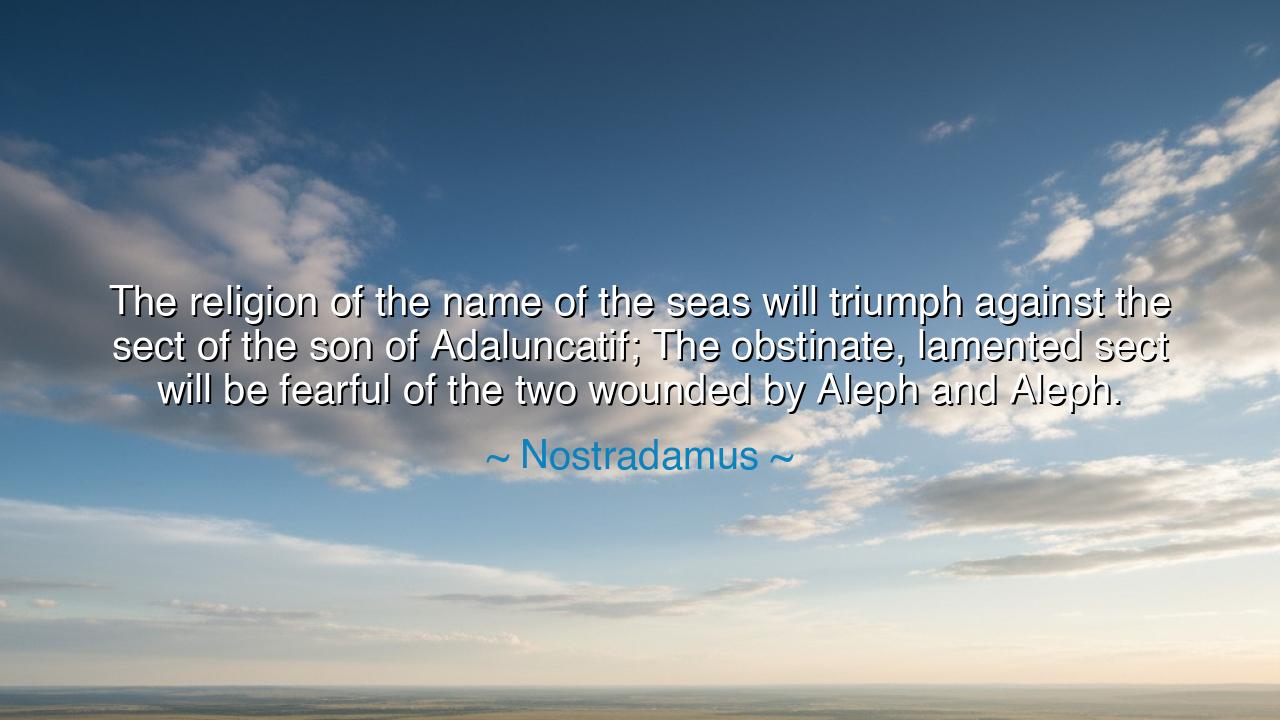
The religion of the name of the seas will triumph against the
The religion of the name of the seas will triumph against the sect of the son of Adaluncatif; The obstinate, lamented sect will be fearful of the two wounded by Aleph and Aleph.






“The religion of the name of the seas will triumph against the sect of the son of Adaluncatif; The obstinate, lamented sect will be fearful of the two wounded by Aleph and Aleph.” – Nostradamus
In this dark and enigmatic prophecy, Nostradamus, the seer of Provence, weaves his vision in the language of mystery and metaphor. Like all his quatrains, this one hides its truth beneath symbols, yet its heart speaks of the eternal struggle between belief and power, between the rise of a new faith and the fall of an old order. When he writes of “the religion of the name of the seas,” he evokes something vast and shifting, a faith as fluid and boundless as the oceans—one that spreads far and wide, transcending the barriers of nation and creed. In contrast, “the sect of the son of Adaluncatif” represents the rigid and failing dogma of the past—those who cling to the old ways, blind to the turning of destiny’s tide.
The origin of this prophecy lies in the sixteenth century, a time of great upheaval. Europe was torn by wars of religion; new empires were rising upon the seas, carrying with them not only weapons but beliefs, languages, and cultures. Nostradamus, who lived among plague, fire, and prophecy, saw beyond his age into the spiritual storms that would one day sweep across the world. The “religion of the seas” may well symbolize the expansion of maritime powers—nations like Spain, Portugal, or later England—whose voyages would spread new ideas, new gods, and new interpretations of truth. Yet it might also foretell something deeper: the birth of a global faith, one that moves like water—uniting rather than dividing, flowing beyond boundaries that once confined the human soul.
To speak of the “sect of the son of Adaluncatif” is to describe those who resist change—the proud and obstinate powers of established belief. The name itself is obscure, but perhaps deliberately so, for Nostradamus often disguised names to veil the specific. “Adaluncatif” may be a cipher for arrogance or false piety, and his “son” the heir of old dominions—perhaps religious institutions grown corrupt or empires sustained by dogma rather than vision. These will, he says, be “fearful of the two wounded by Aleph and Aleph.” The letter Aleph, the first of the Hebrew alphabet, signifies beginnings—the primal spark of creation, the One from which all springs. Two wounded Alephs may symbolize duality—two beginnings scarred, two powers divided by pride, each mirroring the other’s wound. Thus, Nostradamus speaks not only of war, but of the wounding of spirit—the loss of purity in both the new and the old.
The story of humanity often follows this pattern. Consider the fall of the Roman Empire, which once held the ancient gods at its heart. As Christianity—the “religion of the seas,” carried across the Mediterranean—rose in strength, the old faiths of Rome trembled. The followers of Jupiter and Mars mocked the new creed as weak, yet it outlasted them all. The temples of marble crumbled, but faith born in humility endured. Still, that same Christianity, centuries later, would itself fracture into sects, as Luther’s Reformation rose to challenge it. Each age sees its faith wounded, and from each wound, new truth bleeds forth. Thus, the prophecy repeats itself through time.
But Nostradamus speaks not merely of history; he speaks of the soul. The religion of the seas is also the human heart—restless, searching, forever moving toward meaning. The sect of the obstinate is the mind that fears change, that clings to certainty even as truth evolves. And the wounded Alephs are the parts of ourselves divided between what we were and what we must become. Life, he tells us, is a constant struggle between old belief and new awakening. To live wisely is to learn from both—to let the sea wash away what no longer serves, and to preserve what remains sacred and true.
The wisdom of this prophecy is timeless: no faith, no nation, no man can stand unchanged before the tide of truth. The sea does not destroy—it transforms. What resists it is broken; what flows with it is carried to new shores. So too with the spirit. The obstinate will suffer, the fearful will lament, but those who surrender to the great current of life will find healing, even in the wound. For the divine does not dwell in temples alone—it moves through all creation, in every new thought, every act of compassion, every discovery of meaning beyond the known.
So, my child of the turning ages, heed this teaching: be neither the obstinate nor the fearful. Do not cling to the old when life calls you to the new. Let your faith be like the sea—deep, open, and unafraid of change. When your own “Aleph” is wounded—when your certainty falters—remember that even the first letter of creation carries both silence and sound, emptiness and beginning. In that paradox lies the secret of growth. And as Nostradamus foretold, it is not the rigid, but the fluid, who will triumph in the end—the ones who understand that the waves of life, though they wound, also heal, and that the true religion of humankind is not conquest or creed, but transformation.






AAdministratorAdministrator
Welcome, honored guests. Please leave a comment, we will respond soon